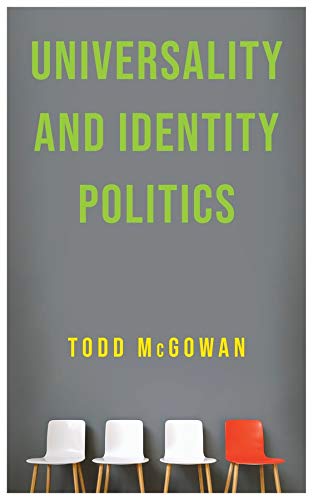Book Review: Universality and Identity Politics
Published:
Todd McGowan’s Universality and Identity Politics has advice for the Left. Today’s theorists are afraid of politics based on universality - it’s seen as homogenizing and emblematic of Nazism and Stalinism. Drawing on Lacanian thought, McGowan rereads universal values such as freedom and equality as emerging from our shared experience of absence. He identifies this unattainable universality with the Left and, conversely, shows how particularism and identity politics are the strategies of the Right. The book concludes with a call for collective struggle.

Here’s the paperback.
Utility: ⭐⭐⭐⭐ (4/5)
Writing: ⭐⭐⭐ (3/5)
This one is new! I always kept my distance from cultural theory and philosophy for fear of getting lost in the dense language. Now, don’t get me wrong - McGowan is no Sapolsky. But, he writes with clarity and minimal jargon. He takes care to draw vague ideas back to relatable and often funny examples. Although his arguments often felt poorly paced (either overly repetitive or seemingly rushed), I could always follow along.
The content itself was great. The book takes care to not assume theoretical background. McGowan demonstrates ideas through a relevant, contemporary examples that include the Trump presidency, Black Lives Matter, and Zootopia. To be fair, listening to his podcast, Why Theory, provided me a lot of context for his thinking. On the show, McGowan and Ryan Engley talk in depth about psychoanalysis and current events.
A final note: you should read the acknowledgements and footnotes. Since the book itself is sober and seriously argued, McGowan squeezes his funny personality into these margins. It was a source of many chuckles.
Notes
Universality
The world is teeming with flagrant and unacceptable inequality. Amid the murder of black men to worldwide sex trafficking, a puzzle emerges: where is the universalist struggles? Although there are camps that advocate for brands of justice, there is a conspicuous absence of a universal effort that articulates universal values.
These values—like freedom and equality—are constituted by absence. Each of us experience a deep nonbelonging to society that emerges from our status as speaking subjects. Universality can never be instantiated; instead, we find it in the struggles of those are denied these values.
The project of universality is tainted by two main misreadings of history. First, Nazism is theorized as a homogenizing, “universalist” project based on moral purity. This is patently false—Nazism was first and foremost a political movement that instrumentally targeted outgroups like the Jews. Second, the disasters of Stalin are also associated with the apparently universal claims of communism. On closer examination, both Stalinism and Marxism make the mistake of trying to make universality present—such a project misunderstands the nature of universality.
Identity Politics
Identity is erroneously believed to be essential. Identity is primarily ideological: it is a medium for social demands, restricting how we perceive and act. Think of how “being” black or “being” a man immediately imposes expectations for what one believes and how one acts. The problem is twofold. First, identity feels so natural that we don’t consciously associate our actions with its demands. Second, identity has a constitutive outside: there is “American” without foreigners, no “man” without women, no Nazi without a Jew.
In contemporary politics, the Right has pulled off a double-maneuver, adopting the tactics of identity politics while applying the label to the Left. Contrast Black Lives Matter and All Lives Matter. Black Lives Matter is a universalist project because rather than demand representation (e.g. in diverse police forces), it highlights and calls for an end to anti-black practices. It is properly universalist, in both its methods and goals. All Lives Matter, on the other hand, misunderstands universality. Adding together “all” the races—black and brown and white and yellow—only leads to a collection of particulars. At least one will be excluded.
Climate change makes universality more important than ever. The political potential of disaster is how it makes universal equality brutally apparent: no one, not even the rich fleeing to higher land, can escape its effect. The political project is twofold: First, to reframe the political terrain and properly reclaim universality for the Left. Second, to fight on behalf of the outside, the shared absence, which we all already share.
